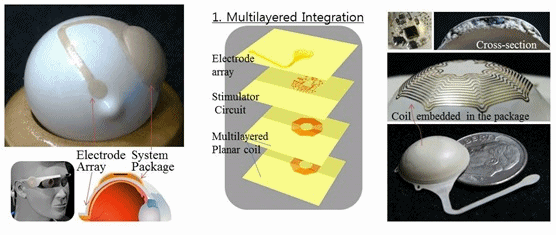Joonsoo Jeong, So Hyun Bae, Kyou Sik Min, Jong-Mo Seo, Hum Chung, and Sung June Kim, Seoul National University, Korea
Volume 62, Issue 3, Page:982-989

A retinal prosthesis is a biomedical implant for restoring partial vision in blind patients suffering from retinal degeneration such as RP and AMD by means of electrical activation of the remaining retinal cells using microelectrode array inserted into retinal space. Despite the recent remarkable progress in clinical trials and regulatory approvals, retinal implants to date are generally based on previous technology of metal package with wire-wound coils that have been used for cochlear implants or deep brain stimulation. A novel all-polymer retinal prosthetic device, therefore, was developed using biocompatible liquid crystal polymer (LCP) to address the problems associated with conventional metal- and polymer-based devices: the hermetic metal package is bulky, heavy and labor-intensive, whereas a thin, flexible and MEMS-compatible polymer-based system is not durable enough for chronic implantation. Exploiting the advantageous properties of LCP such as a low moisture absorption rate, thermo-bonding and thermo-forming, we fabricated a small, light-weight, long-term reliable retinal prosthesis that can be conformally attached on the eye-surface with the diameter of 14 mm, the maximum thickness of 1.3 mm and total weight of 0.38 g. A LCP fabrication process using monolithic integration and conformal deformation was established enabling miniaturization and a batch manufacturing process as well as eliminating the need for feed-through technology. In the monolithic fabrication, all the electronic components including the electrode array, coil, and circuit were integrated onto a single body of multilayered LCP films and packaged by the same material. Its efficacy and implantation stability were verified through in vivo rabbit experiments by measuring the cortical potential and monitoring implanted dummy devices for more than a year, respectively. (Seoul National University, Nano Bioelectronics & Systems Laboratory: http://nanobio.snu.ac.kr)
Keywords: liquid crystal polymer, LCP, retinal prosthesis, monolithic fabrication, neural prosthetics, conformable

